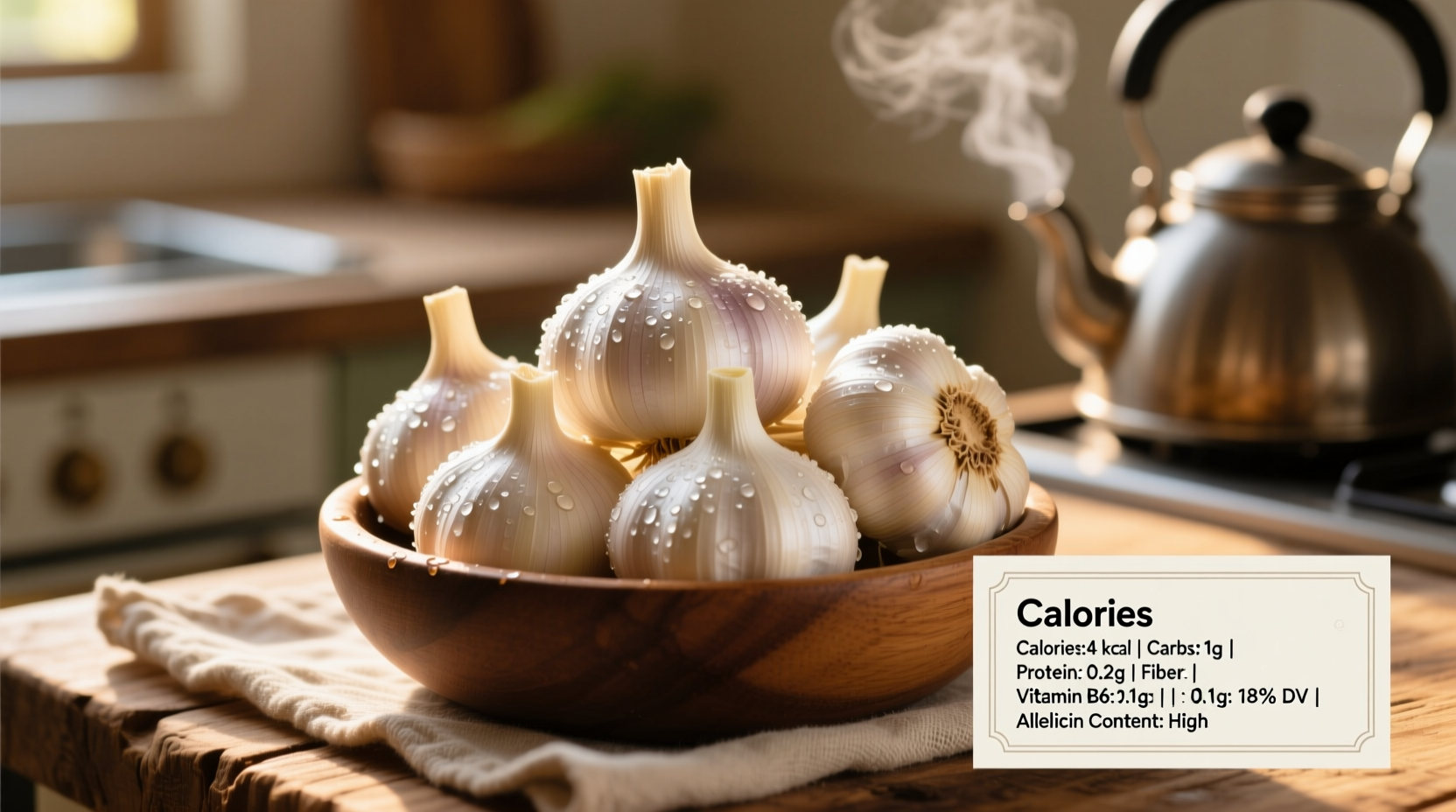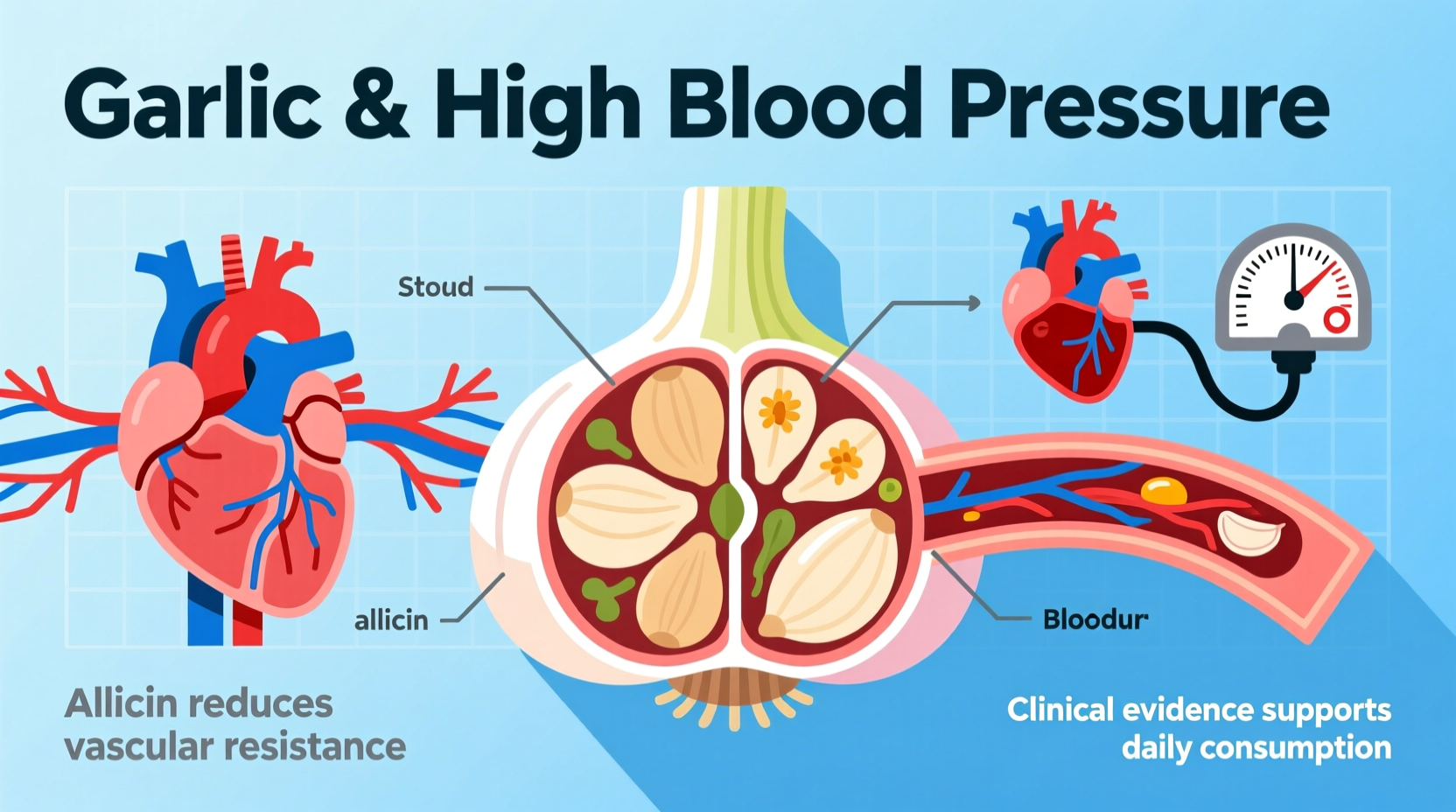For those managing high blood pressure, understanding natural approaches that complement medical treatment is crucial. As someone who's studied the science behind culinary ingredients for over a decade, I've examined how traditional remedies like garlic intersect with modern medical research. Let's explore what evidence actually says about garlic's role in blood pressure management.
The Active Compound: Why Garlic Might Help
When you crush or chop fresh garlic, an enzyme called alliinase converts alliin into allicin—the compound responsible for garlic's distinctive smell and potential health benefits. Allicin works by increasing hydrogen sulfide production in blood vessels, which helps them relax and improve blood flow. This biological mechanism explains why researchers have investigated garlic's potential cardiovascular benefits.

What Scientific Research Actually Shows
Multiple clinical studies have examined garlic's effects on blood pressure. A comprehensive 2020 meta-analysis published in Experimental and Therapeutic Medicine reviewed 12 randomized controlled trials involving 845 participants. The analysis revealed that garlic supplementation reduced systolic blood pressure by an average of 6.71 mmHg and diastolic pressure by 4.12 mmHg compared to placebo.
| Study Duration | Garlic Form | Average BP Reduction | Participant Type |
|---|---|---|---|
| 24 weeks | Aged garlic extract (1.2g/day) | 11.8/5.4 mmHg | Uncontrolled hypertension |
| 12 weeks | Garlic powder (600-900mg/day) | 5.2/3.1 mmHg | Mild hypertension |
| 8 weeks | Raw garlic (1-2 cloves/day) | 4.6/2.3 mmHg | Prehypertension |
These findings align with research from the National Center for Complementary and Integrative Health (NCCIH), which notes that "garlic may have a small effect on blood pressure, but the evidence is not strong." The American Heart Association acknowledges garlic's potential as a complementary approach but emphasizes it shouldn't replace prescribed treatments.
How Much Garlic Is Actually Effective?
Based on clinical evidence, effective garlic consumption typically involves:
- Raw garlic: 1-2 cloves (approximately 4 grams) daily, crushed and allowed to sit for 10 minutes before consumption
- Garlic supplements: 600-1,200 mg of aged garlic extract daily, standardized to contain 1.3% S-allyl cysteine
- Cooked garlic: Less effective due to allicin degradation, but still beneficial when used generously in meals
Consistency matters—research shows benefits typically emerge after 8-12 weeks of regular consumption. The European Food Safety Authority notes that "a daily intake of 0.07-0.13 mg of allicin from garlic and garlic preparations may help maintain normal blood pressure" (EFSA Journal, 2012).
Important Limitations and Safety Considerations
While garlic shows promise as a complementary approach, several critical factors determine its appropriateness for your situation:
When Garlic Isn't Sufficient
Garlic's blood pressure effects are generally modest compared to prescription medications. If your systolic pressure exceeds 140 mmHg or you have additional cardiovascular risk factors, medication remains essential. The Mayo Clinic emphasizes that "garlic supplements shouldn't be considered a replacement for standard treatment for high blood pressure" (Mayo Clinic, 2023).
Potential Medication Interactions
Garlic can interact with several common medications:
- Blood thinners: May increase bleeding risk when combined with warfarin or aspirin
- HIV medications: May reduce effectiveness of saquinavir
- Some blood pressure medications: Could potentially cause excessive lowering
Always consult your healthcare provider before adding garlic supplements to your regimen, especially if you take prescription medications.
Practical Ways to Incorporate Blood Pressure-Friendly Garlic
Maximize garlic's potential benefits with these evidence-based approaches:
Optimal Preparation Methods
To preserve allicin, crush or chop garlic and let it sit for 10 minutes before cooking. This allows the alliinase enzyme to fully activate. Add garlic toward the end of cooking to minimize allicin degradation—studies show that 60 seconds of microwave exposure or 45 minutes of oven roasting can destroy up to 90% of allicin.
Simple Daily Incorporation
Try these practical approaches:
- Mix crushed raw garlic with olive oil and lemon juice as a salad dressing
- Add minced garlic to soups during the last 5 minutes of cooking
- Prepare a garlic-honey infusion by storing crushed garlic in raw honey
- Use black garlic, which contains stable bioactive compounds that survive cooking
Managing Expectations: Garlic in Context
Think of garlic as one component of a comprehensive blood pressure management strategy that includes:
- Regular physical activity (150 minutes weekly)
- Dietary Approaches to Stop Hypertension (DASH) eating pattern
- Sodium restriction (under 2,300 mg daily)
- Stress management techniques
- Regular blood pressure monitoring
The Centers for Disease Control and Prevention states that "lifestyle changes can lower your blood pressure by about as much as a single blood pressure medication—and when you combine more than one healthy habit, you can have an even greater impact" (CDC, 2023).
When to Rely on Medical Treatment Instead
While exploring natural approaches like garlic for high blood pressure, recognize these critical situations where medical intervention is essential:
- Systolic blood pressure consistently above 140 mmHg
- Diastolic pressure above 90 mmHg
- Presence of additional cardiovascular risk factors
- History of heart attack, stroke, or kidney disease
- Pregnancy with hypertension
Remember that untreated hypertension significantly increases your risk of heart attack, stroke, and kidney failure. The American Heart Association reports that nearly half of American adults have high blood pressure, yet only about one in four have it under control (AHA, 2023).
Final Considerations for Blood Pressure Management
Garlic shows promise as a complementary approach for blood pressure management, but its effects are modest and vary between individuals. The most effective strategy combines evidence-based lifestyle modifications with appropriate medical treatment when necessary. Always work with your healthcare provider to develop a personalized plan rather than relying solely on natural remedies for a condition as serious as hypertension.











 浙公网安备
33010002000092号
浙公网安备
33010002000092号 浙B2-20120091-4
浙B2-20120091-4